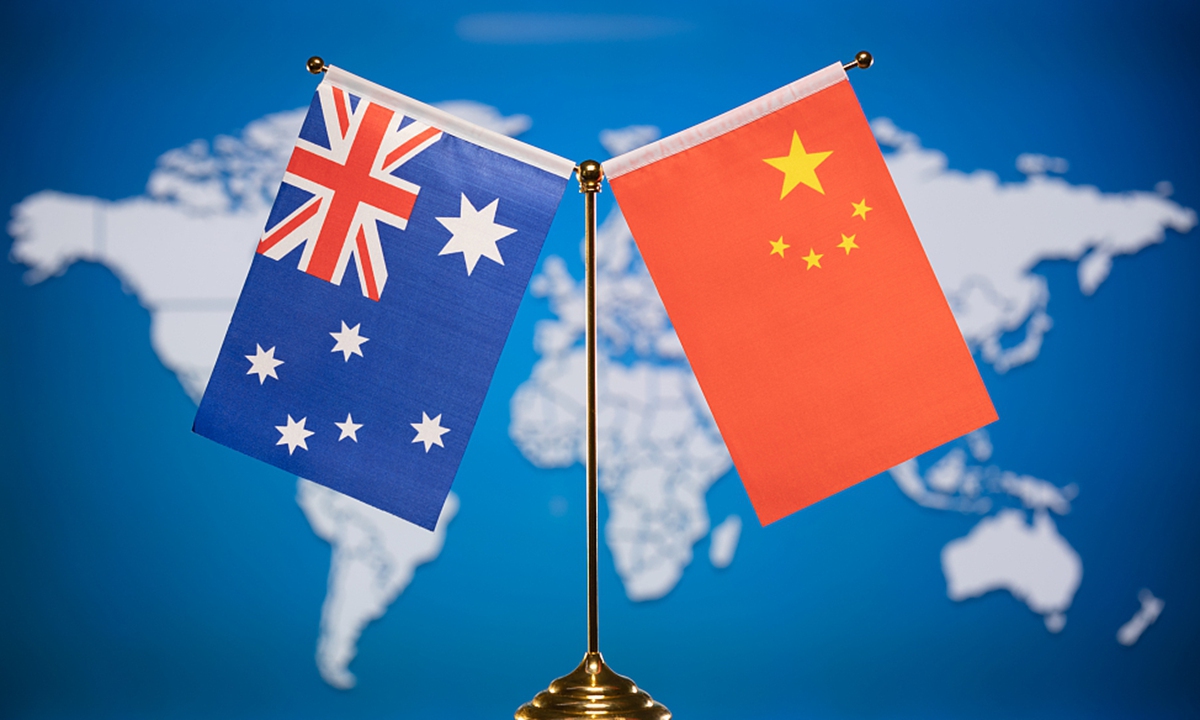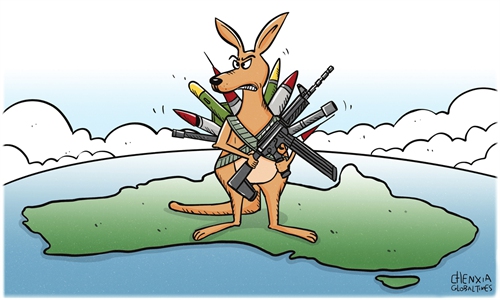
China Australia. Photo: VCG
Australia recorded booming exports recently as it "rides out Chinese sanctions," thanks to increased trade with other Asian countries in addition to Chinese demand for iron ore and other critical products, the Financial Times reported on Thursday.According to the report, a shift has taken place in Australia's trade over the past two years. China's share of Australia's exports had dropped to 29.5 percent as of August, according to Australian Bureau of Statistics data - the first time it had dipped below the 30-percent mark since October 2015. China's share of imports has also dwindled to 26 percent in the three months to September, compared to 30 percent in 2021.
First and foremost, China has never imposed trade "sanctions" on Australia, and any claim of "sanctions" is just delusional. Clearly, some in Australia were quite proud about the recent figures, thinking they had successfully reduced the dependence on China. What they didn't realize was that cutting themselves off from China and becoming a pawn in the US' strategic containment against China will end up costing Australia even more, sabotaging its prospect as a bridge between the West and the East.
It's obvious that some media reports try to use the data in a selective way to prove that Australia is not as dependent on China for trade as it used to be due to its diversification efforts. However, it should be noted that the drop in Australian exports is due in large part to the fall in iron ore prices this year. What relevant media reports failed to mention is that data still show that China remains the most important part of Australia's overall foreign trade.
In the first nine months of this year, despite the 14.1 percent decrease in China's imports from Australia, Chinese exports to Australia jumped 25 percent year-on-year, according to China's General Administration of Customs.
At a time when the global economy and trade is facing increasing headwinds and pressure, it is not easy for bilateral trade to remain this resilient. This shows that despite the serious difficulties and setbacks in bilateral relations over the past few years, as well as some Australian politicians' effort to decouple from China, practical cooperation has continued to expand.
The resilience of China-Australia trade lies in the strong complementarity of economic cooperation between the two countries. China is a massive market, while Australia is a long-term and stable supplier of mineral and energy goods, forming a strong interdependence between the two sides. China has a huge demand for Australia's iron ore, natural gas and other resources products, while Australia relies heavily on imports of Chinese-made products, such as electronics, home appliances, clothing and so on.
The trade structure makes it hard for both sides to find suitable alternatives. In fact, it is the complementary nature of the two economies as well as their trade exchanges over the years that have still steered bilateral trade from being derailed significantly despite the freeze in bilateral diplomatic relations.
At present, the relationship between China and Australia is at a critical juncture. Although there remains many challenges and obstacles ahead, expectations for thawing bilateral ties have been growing, especially after the resumption of high-level talks between the two sides.
In July, Chinese State Councilor and Foreign Minister Wang Yi met Australian Foreign Minister Penny Wong on the sidelines of the G20 meeting in Bali, Indonesia, the first such high-level meeting between the two countries in three years. The two sides reaffirmed their comprehensive strategic partnership, and expressed willingness to strengthen engagements, enhance mutual trust, properly handle differences, remove obstacles, and promote practical cooperation in the spirit of mutual respect and mutual benefit. These examples of consensuses are significant for the future development of China-Australia relations.
It is clear to all that the root cause of bilateral tensions lies in politics, not economics, and it is undeniable that there are complex challenges for improving China-Australia ties ahead. Yet, no matter how the situation changes, the win-win nature of China-Australia trade will not change and China's open attitude toward cooperation based on mutual respect and equality won't change.
Whether Australia can truly put its own national interests first and adopt a pragmatic attitude toward China and refrain from the unnecessary hostility will be crucial for bilateral economic and trade cooperation. Intentionally ignoring the mutually beneficial nature of China-Australia trade and artificially pushing for a so-called economic decoupling would be a grave mistake.



